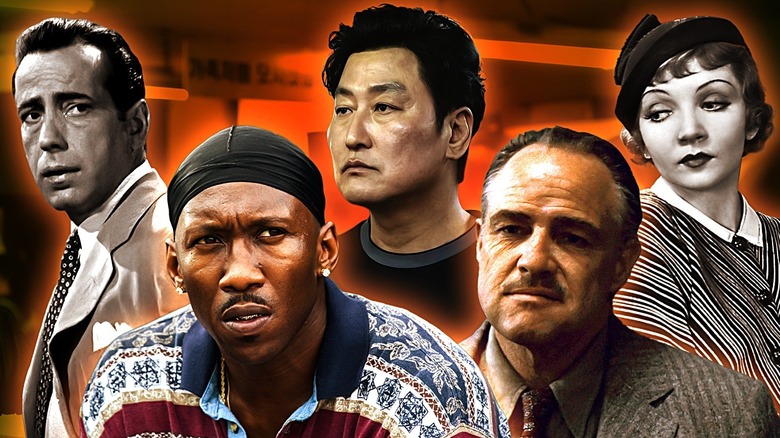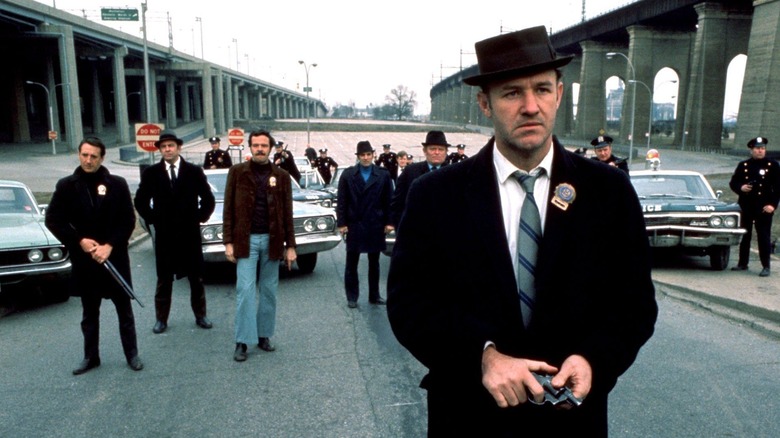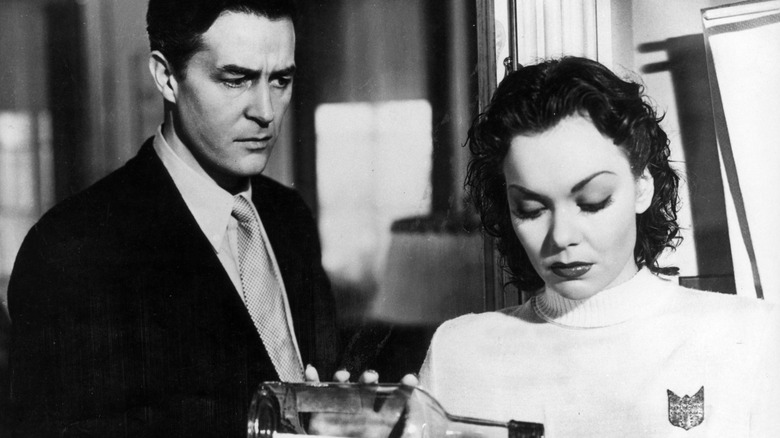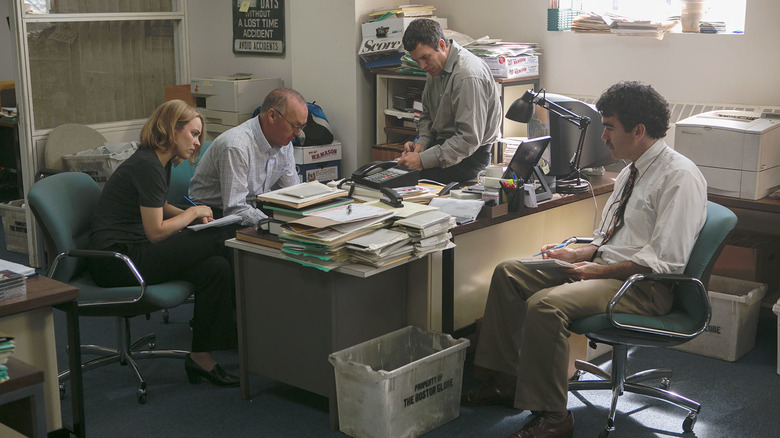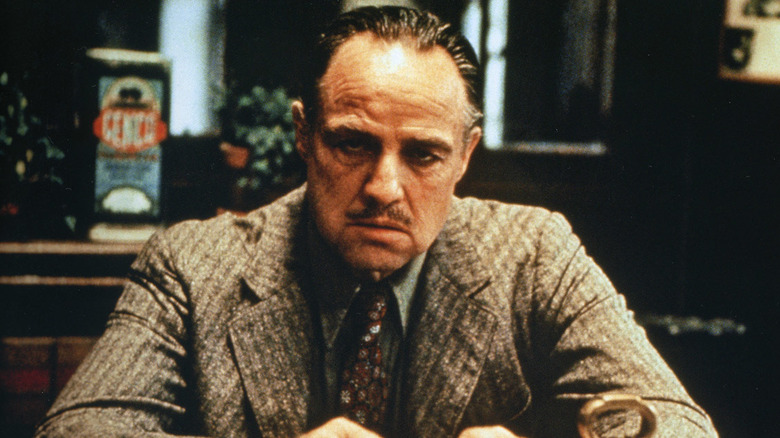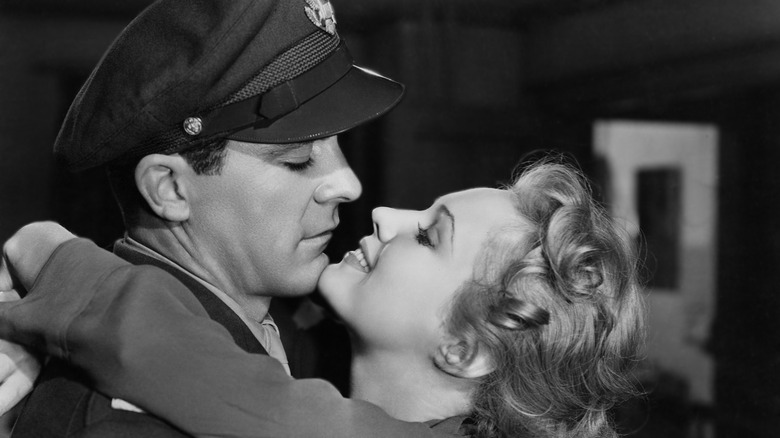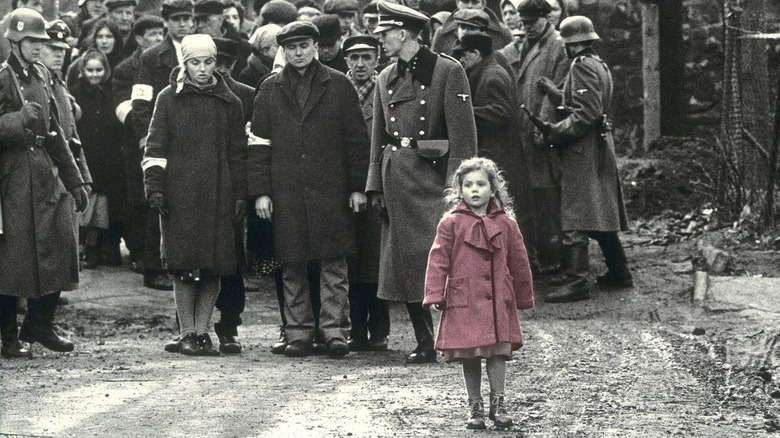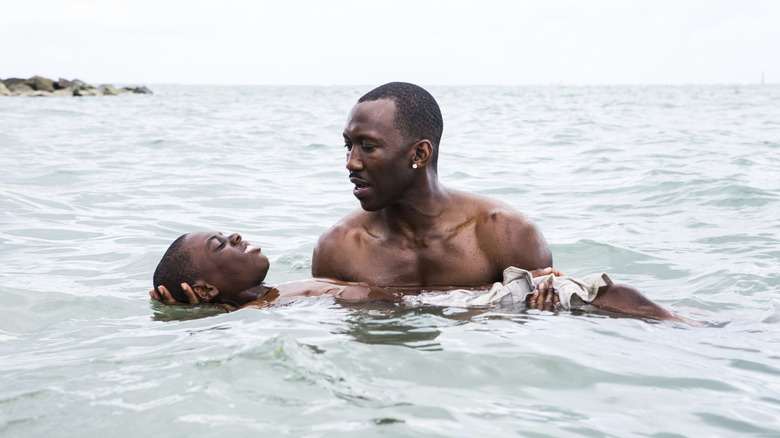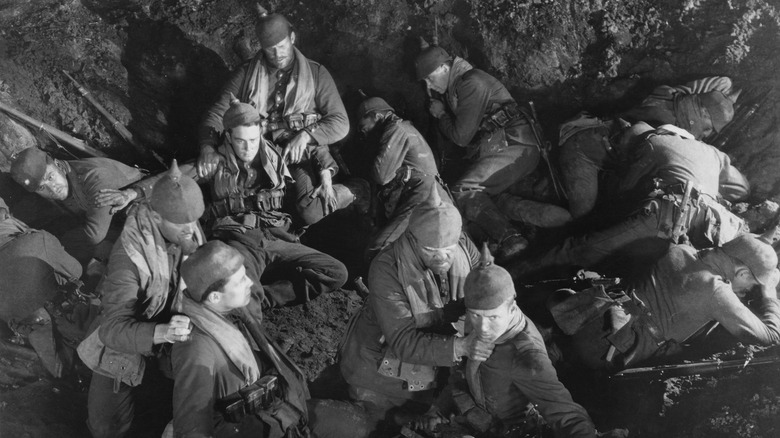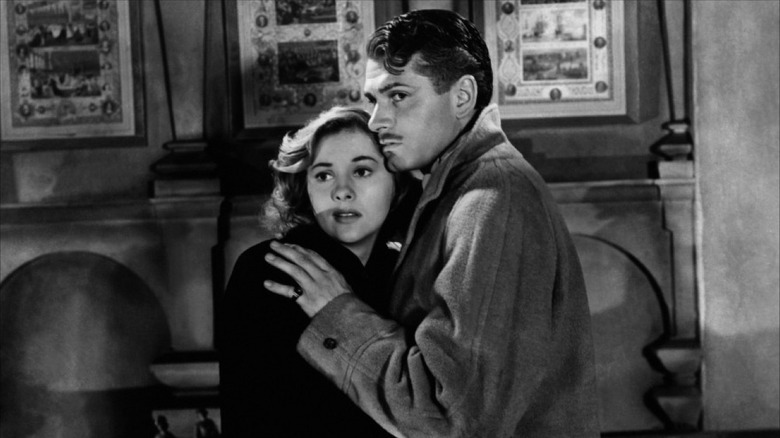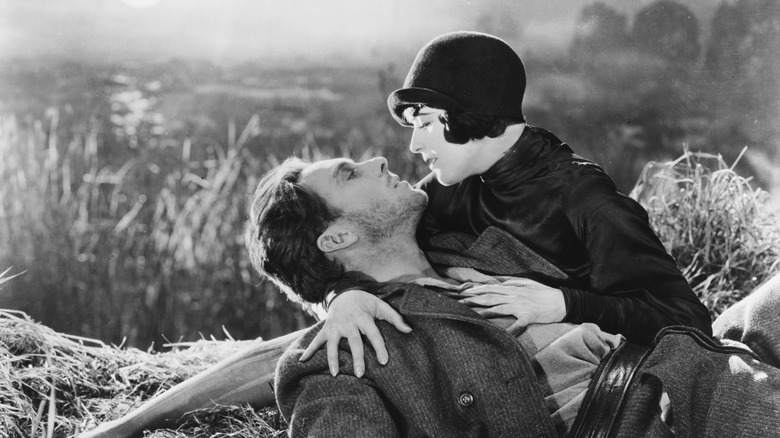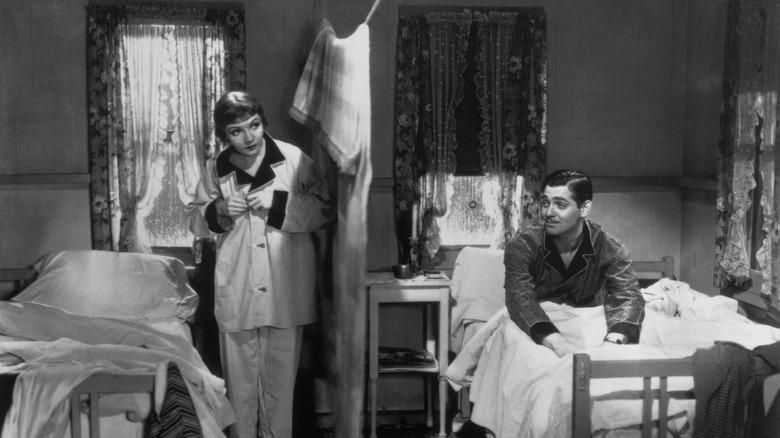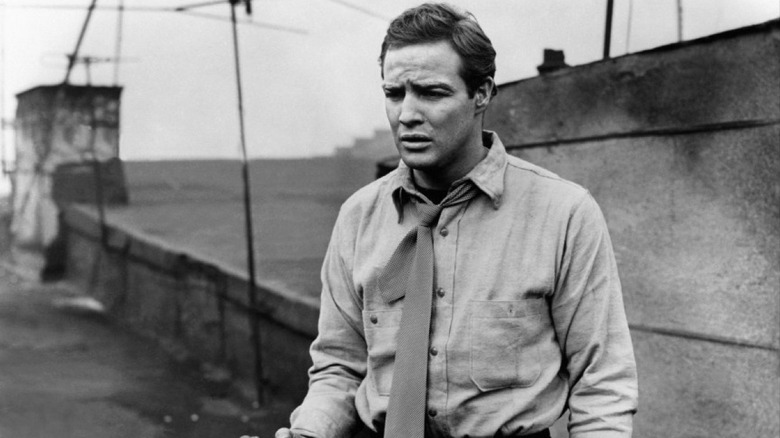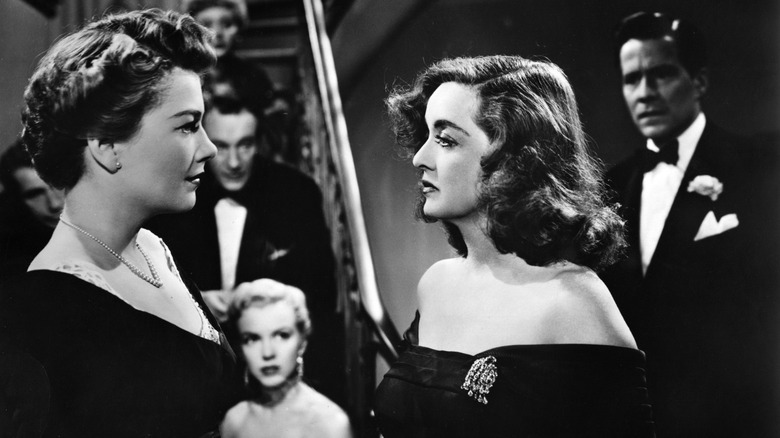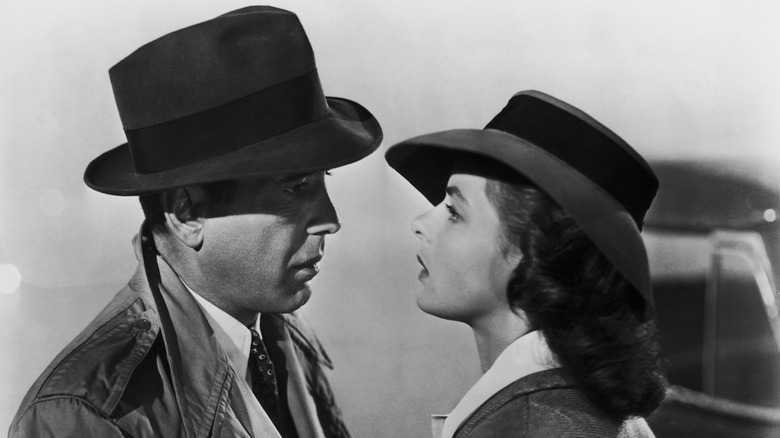The 15 Best Best Picture Oscar Winners, According To Rotten Tomatoes
When a film makes it all the way to the Academy Awards and takes home the top prize of best picture, a safe assumption to be made is that said movie is probably pretty good. Right? Well, that should be the case, but whatever reason, every once in a while a film sneaks through that just isn't up to snuff ("Green Book," anyone?) and leads future audiences to wonder exactly what the Academy was thinking.
That's the exception, not the rule, however. Most best picture winners are worthy of their title, even if some fans may quibble over what the actual best film of the year was. But even amongst this lofty category, there are films that stand out as the best of the best. If there was to be an Academy Awards: All Stars Edition (and honestly, we'd be open to it), these 15 would be the ones that would make the cut. No matter how long ago they were released, they still have a special cache among film lovers, and are generally acknowledged to be bona fide classics.
The French Connection - 97%
In the early 1970s, we were seemingly inundated with gritty antihero cop dramas, but "The French Connection" is one of the best of the bunch. It stars Gene Hackman and Roy Scheider as Popeye and Cloudy, a pair of New York City police officers in the narcotics division who get mixed up in a French drug-smuggling case. A criminal from Marseilles plots to sneak a carload of heroin into the United States, an operation that ends up attracting the attention of both the local police and the FBI, taking Popeye and Cloudy down a bumpy path.
"The French Connection" cleaned up at the Academy Awards in 1972, taking home statuettes for best picture, best director (William Friedkin), best actor (Gene Hackman), best screenplay, and best film editing. It's widely considered one of the greatest films of all time, with a 97% on Rotten Tomatoes, and between its exciting action set pieces and attention to narrative drama, "The French Connection" is just as thrilling today as it was when it was first released in theaters over 50 years ago.
The Lost Weekend - 97%
If you've seen "Mad Men," you might assume that pretty much every white-collar man in the early 20th century was a functioning — or not-so-functioning — alcoholic. In plenty of older movies, drunks are played for laughs, hiccupping and falling down in the street. But "The Lost Weekend," directed by Billy Wilder and released in 1945, was one of the first to provide a glaringly honest look at the ravages of alcoholism.
Starring Ray Milland, it details the experiences of a down-on-his-luck writer over the course of one weekend, wherein he does everything in his power to sneak a drink under the noses of his concerned brother and girlfriend (Phillip Terry and Jane Wyman, respectively) and eventually grapples with what alcohol is doing to his life. In addition to its win for best picture, Wilder and Milland also took home prizes for best director and best actor, respectively. With an extremely respectable 97% on Rotten Tomatoes, age has done little to dull the impact of this sobering drama.
Spotlight - 97%
You can't tell by the text, but imagine that every time you read the title "Spotlight," we're saying it in a Boston accent — trust us, it'll make it more fun. And fun is something in short supply in "Spotlight," given its dark subject matter. An investigative team at the Boston Globe sets out to find their next story, and what they uncover threatens to rock not just the Boston community, but the Catholic church at large.
Thanks to victims coming forward and a good, old-fashioned paperwork trail, they're able to discover that the Catholic church was not only aware of the fact that it had a serious problem with priests sexually assaulting young members of their congregation, but in many cases actually helped with the cover-up. When a priest would draw too much attention to themselves, they would simply be sent to another parish, allowing them to continue their abuse. Based on a true story, "Spotlight" is a heartbreaking look at the dark side of the Catholic church, and the power of journalism to shine a light on crimes even within one of the most powerful institutions in the world.
The Godfather - 97%
Absolutely none of our readership should be shocked to see "The Godfather" on this list — frankly, it's just a surprise that it isn't higher up, but we guess a 97% rating on Rotten Tomatoes is pretty impressive. Based on the crime saga of Mario Puzo, "The Godfather" stars Marlon Brando as Don Vito Corleone, the head of a mob family who is faced with new threats from those who seem him as vulnerable, as well as the challenges of deciding who will take over the family business.
His son Michael (Al Pacino), intelligent and level-headed, is the obvious choice — except Michael seemingly wants nothing to do with his shady business dealings. When he finally — and reluctantly — gets involved, it's almost alarming how quickly he is sucked into a world of violence and the constant threat of treachery. Michael's tragedy is two-fold: That he can't escape becoming a part of the mob, and that he can't admit to himself it's what he has a natural talent for. One of the most defining movies of the 20th century, "The Godfather's" place in history as both a stirring character drama and a brutal crime film is all but guaranteed.
The Best Years of Our Lives - 98%
Compared to the long legacy of some of the other best picture winners, even the ones that have a much lower score on Rotten Tomatoes (this sits at an astonishing 98%), "The Best Years of Our Lives" seems all-but-forgotten. That's a shame, though, because it deserves much more attention that it has received over the years. It stars Fredric March, Dana Andrews, and Harold Russell as three soldiers recently returned home after World War II, and their individual challenges with re-entering civilian life.
Although Homer (Harold Russell) has made the most significant sacrifice to the war effort, having lost both of his hands in combat, none of the men have come out of the war entirely unscathed. Filmed by the time victory was largely assured, "The Best Years of Our Lives" is given the rare license to present a different side of the American soldier's experience. Its nuanced portrayal of veterans returning home resonated with critics and audiences, and it took home seven Academy Awards, including best director, best actor (Fredric March), and best supporting actor (Harold Russell).
Schindler's List - 98%
It wouldn't be quite fair if at least one of Steven Spielberg's most beloved films didn't make an appearance on this list. The one that claims a top spot is arguably his most emotionally devastating, "Schindler's List." Based on a true story, it revolves around the World War II experiences of German industrialist Oskar Schindler (Liam Neeson), who — with the help of his Jewish account, Itzhak Stern, played by Ben Kingsley — quietly and efficiently saved over a thousand Jewish lives by having them transferred to his factories during the Holocaust, claiming that their work was needed for the war effort.
All of this under the noses of the Nazi elite, who he remained friendly with throughout the war to avoid arousing suspicion and to help facilitate his actions. But when he looks back, in one of the most poignant moments of the film, all he can think about is how much more he could have done. "Schindler's List," with a 98% on Rotten Tomatoes, marks the first time that Steven Spielberg, already a cinema legend by the time it came out, won an Oscar for best picture and best director.
Moonlight - 98%
One of the most recent entries on this list, "Moonlight" also comes with arguably the most interesting Oscar story — it entered the annals of history when Oscar presenters accidentally announced "La La Land" as the best picture winner, only to be corrected by producer Jordan Horowitz (after half the production team had already given their speeches, mind you).
But all that secondhand embarrassment aside, "Moonlight" is a truly deserving best picture winner (no shade to "La La Land," by the way, which is also a delight). It tells the story of Chiron at three distinct phases of his life — as a child, a teenager, and an adult — and how he comes to understand what it means to be a man from the various influences that surround him. Gorgeously shot by Barry Jenkins, "Moonlight" is a sensitive portrayal of masculinity and how it relates to Black queer identity, a topic underexplored in mainstream cinema.
All Quiet on the Western Front - 98%
In 1930, just a decade and change after the devastating events of World War I, Lewis Milestone made one of the most defining anti-war films of all time. Based on the classic novel "All Quiet on the Western Front" by Erich Maria Remarque, it follows the journey of a young German soldier as he is shipped off to the front. While he begins with jingoistic enthusiasm, high off the pro-war propaganda that had been fed to him since birth, it isn't long before he sees another side of the pointless, indiscriminate violence of trench warfare.
As he fights every day to survive, he begins to feel profoundly disillusioned with the war, confused about what they're even fighting for, and disappointed with the older members of his community who lied to him and his classmates about the glory of battle. Although it was remade to great acclaim in 2022, the original film version of "All Quiet on the Western Front" is a heartbreaking spectacle of early cinema, released just few short years after the introduction of sound.
Rebecca - 98%
What to make of the poor, sweet Mrs. de Winter (Joan Fontaine), who is seemingly such a poor stand-in for her late predecessor that she doesn't even have a name of her own, she's just called "the second Mrs. de Winter?" In "Rebecca," she feels as though she's living a Cinderella story when she meets and falls in love with a handsome aristocrat (Laurence Olivier), who promptly marries her and whisks her off to his imposing country estate, Manderley.
But it isn't long before she begins to feel the weight of his deceased first wife, Rebecca — Manderley is haunted by her presence. Although there are no actual ghosts in "Rebecca," it's nonetheless a gothic masterpiece in which Alfred Hitchcock cultivates a tremendous amount of atmosphere. It was remade starring Armie Hammer and Lily James in 2020, although the remake can't hold a candle to the original, which has a 98% on Rotten Tomatoes and, in addition to winning richly-deserved Oscars for best picture and best cinematography, earned nominations for Fontaine, Olivier, and Judith Anderson as the wildly unsettling Mrs. Danvers.
Sunrise - 98%
Released in 1927, "Sunrise: A Song of Two Humans" was the very first best picture winner. In fact, it won back when the Academy, still trying to figure out how to run an Oscars ceremony, handed out two best picture awards, one for best unique and artistic picture ("Sunrise") and one for outstanding picture (Wings"). So the fact that after all these years, a silent film from 1927 can still be considered one of the best ever winners means that this one has to be something special. (At least on Rotten Tomatoes, it ultimately won the battle against "Wings" — "Sunrise" has a 98%, while "Wings" is at 93%.)
A moral play, "Sunrise" follows a young farmer who, despite having a loving wife (Janet Gaynor) and a young child, is finding himself growing bored of his country life. Enter the Woman from the City, a shameless flapper who wastes no time in seducing him. "Sunrise" showcases the incredible expressive quality that silent movies are capable of, and its visuals are captivating to this day.
It Happened One Night - 98%
One of the few films to win the Big Five at the Academy Awards (best picture, best director, best screenplay, best actor, and best actress), "It Happened One Night" is a gem of pre-Code filmmaking. Released just a few months before the Hays Production Code took effect in Hollywood, this film gets in under the wire and allows one last gasp of creative freedom. Claudette Colbert stars as Ellie, a bride on the run, who has eloped with her gold-digging fiancé and is now trying to avoid her father, who wants the marriage annulled.
She crosses paths with Peter (Clark Gable), a down-on-his-luck journalist who offers to help her in exchange for an exclusive story. As they travel together, their bond grows stronger, and in spite of their initial disdain for one another, the chemistry they share becomes impossible to ignore. Between Colbert flashing her leg to get a passing motorist to stop for them and Clark Gable single-handedly dismantling the undershirt industry by appearing shirtless as he changes to go to bed (possibly just an urban legend, but a fun one), "It Happened One Night" is a playfully sexy in a way that has helped it feel modern nearly 100 years later.
On the Waterfront - 99%
By the end of his career, Marlon Brando's legacy had taken more than a few knocks, after years of stories about him needing to be fed lines via an earpiece and generally unprofessional behavior on set in his later years. But back in the early '50s, there was simply no one who could do what Brando could. Nowhere is this more clear than in "On the Waterfront," where he plays Terry Malloy, a dockworker who bemoans the loss of his career as a promising young boxer after being convinced to throw a fight. As we all know by now, he could have been a contender.
Although "On the Waterfront" is noteworthy from a cultural context, coming out from disgraced director Elia Kazan who had testified to the House Un-American Activities Committee in the midst of fervent anti-communism, it's impossible to ignore the sheer significance Brando's performance had on the entire field of acting. The Academy plainly agreed — in addition to earning its filmmakers the best picture Oscar, "On the Waterfront" got Brando a golden statuette of his very own.
Parasite - 99%
When "Parasite" won best picture in February 2020, the ebullient response it received from the Hollywood crowd was partially because it is, of course, an excellent film, but also because it seemed to represent a changing of the guard at the Academy. Over 90 years into Academy Awards history, and this was the first time that a non-English language film had ever taken the top prize. In fact, it was only the 12th non-English language film to even be nominated for best picture.
"Parasite" revolves around the industrious Kim family, who live on the cusp of squalor and are frequently engaged in less-than-legitimate means to make quick money. Their lives change forever when Ki-woo (Choi Woo-shik) gets a job as an English tutor for a wealthy family, and the rest of them methodically insinuate themselves into their lives. The twisted and hilarious "Parasite" is a searing indictment of late-stage capitalism, and how the economic system leads the haves to leech off the have-nots.
All About Eve - 99%
What does an aging actress have to fear more than a bright young ingenue coming along to steal her spotlight, her career, her very life? In "All About Eve," Margo (Bette Davis) is a supremely confident stage actress on the wrong side of 40 who is only too happy to help out Eve (Anne Baxter), her number one fan. After all, Eve comes to her show every night and openly fawns over Margo. How much of a threat could she be? Well, as Margo quickly learns after hiring her as an assistant and watching Eve's mask fall, the younger woman's ambitions don't stop at the stage door.
"All About Eve" taps into a fear that goes beyond the mere prospect of aging — it's about being replaced, forgotten. It has the auspicious honor of being the only film in Academy history to have four of its actresses each nominated for an Oscar, with both the stunning Davis and the cold-as-ice Baxter competing in the lead category, and Celeste Holm and Thelma Ritter in the supporting category, as Margo's best friend and her maid, respectively. Although they didn't take home any acting awards, the best picture Oscar and the enduring legacy of "All About Eve" are nothing to sneeze at.
Casablanca - 99%
It should come as no surprise that "Casablanca" sits atop of a list of highest-rated best picture winners, since it so frequently appears amongst the greatest films of all time. This World War II drama stars Humphrey Bogart in one of his most captivating roles: Rick, the American owner of a bar in Casablana, Morocco, a generally good man who spends most of his time trying to convince himself and others that he's actually the opposite.
One day, Ilsa (Ingrid Bergman), the love of his life, turns up, hoping that Rick will be able to help get exit papers for her and her husband Victor Laszlo (Paul Henreid), a Czech resistance fighter being pursued by the Nazis. But her appearance brings up a host of memories for Rick, memories he had tried to bury deep down.
Part dreamy romance, part emotionally evocative refugee drama, "Casablanca" benefits enormously from the presence of European cast members and extras who had themselves fled the Nazi regime. The sequence where Victor leads the bar in a stirring chorus of the French national anthem to drown out the German soldiers' patriotic singing is enough to land it a spot here on its own — that and the impressive 99% "Casablanca" currently has on Rotten Tomatoes.
